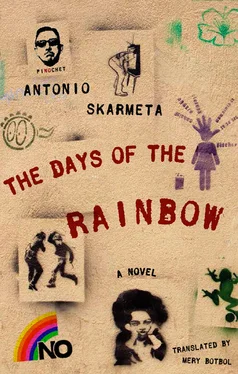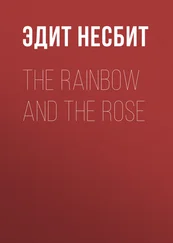Antonio Skarmeta
The Days of the Rainbow
TO
Roberto Parada Ritchie and his family
TO
Manuel Guerrero and his family
TO
Raúl Alarcón
Erano i giorni dell’arcobaleno,
finito l’inverno tornava il sereno.
Those were the days of the rainbow,
When the winter ended, clear skies returned.
— NICOLA DI BARI

ON WEDNESDAY, they arrested Professor Santos.
Nothing unusual these days. Except that professor Santos is my father.
Our first class on Wednesdays is philosophy, followed by gym class and then algebra for two periods.
We normally go to school together. He makes coffee and I make fried eggs and put the bread in the toaster. Dad likes his coffee strong with no sugar. I have mine with a lot of milk, and even though I don’t use sugar either, I stir it as if I do.
This month the weather is bad. It’s cold and it drizzles, and people cover their noses with their scarves. Dad has a light-colored raincoat, beige, like the ones detectives wear in the movies.
I put my black leather jacket on top of my uniform. The raindrops slide down over it, and I don’t get wet. The school is only five blocks away. As soon as we get out of the elevator, Dad lights his first cigarette and smokes it slowly until we get right to the school door.
He makes his cigarette last exactly that long, then he throws the butt to the ground and makes a theatrical gesture so I crush it with my shoe. Then he goes to the teachers’ lounge to pick up the class book, and when he gets to our classroom he asks where we left off last time.
Last time we were discussing Plato and the allegory of the cave.
According to Plato, men live like zombies watching moving images on the wall of a cave, images that are nothing but the shadows of the real things outside projected by a fire against the wall. Those men, who have never seen the real things, believe that these shadows are real things. But if they came out of the cave and saw everything in plain sunlight, they would realize that they had lived in a world of shadows and that what they thought to be true is only a pale reflection of reality.
Professor Santos takes attendance before getting back to Plato, and if a student is absent he puts a red dot next to his name. Although we walked to school together, when he gets to S , immediately after “Salas” he says “Santos,” and I have to answer, “Here.” My father argues that the coincidence of having to take philosophy with him does not release me of any of my responsibilities, even the absurdity of having to answer the roll call. He says that if I don’t study, even though I’m his son, he’ll fail me.
I like philosophy, although I wouldn’t like to be a teacher like Daddy because then I’d have to get up early in the morning, smoke black cigarettes, and, on top of all that, I wouldn’t make much money.
Before starting the lesson, my father brushes off his lapels just in case he dropped ash on them. And then he says his favorite phrase: “Why is there Being rather than Nothing?” And adds: “That’s the million-dollar question. And that is, after all, the only question and the big question of philosophy.”
The question that worries me lately is that, if there is Being, there must be a meaning for it, because if there were no meaning, it would be irrelevant whether or not there was Being.
My girlfriend, Patricia Bettini, says that the meaning of Being is just being; that’s it, without any purpose of any kind. She asks me not to complicate things so much and to be more spontaneous. She’s kind of a hippie.
That very Tuesday night, before they arrested him, I explained to my Dad Patricia Bettini’s thoughts, and he got outraged. He put salt twice in his soup and then he pushed it to the side and said he wouldn’t eat it because it was too salty.
I turned on the TV, but the first image was of Pinochet kissing an old lady and I turned it off before Daddy could see it.
He then used the occasion to tell me that I shouldn’t trust Patricia Bettini so much because if she thinks that Being is nothing more than what Being is being, she’s missing something that no intelligent girl would ever forget, that men have consciousness, that men are Being and, simultaneously, they think about Being, and therefore they can give Being a meaning and a direction. That is to say, they can set values and can aspire to those values. Goodness is goodness. Justice is justice, and there is no such thing as “justice as far as possible.”
According to my daddy, what matters most is ethics, that is, what we do with Being.

ON THURSDAY AFTERNOON, Adrián Bettini got a letter. It was not delivered by his usual mailman but by two young officials with police badges under their lapels. They rang the bell briefly and smiled to the maid while they asked to hand deliver the letter to the owner of the house. The young Nico Santos, invited that day to have tea with the family, watched the scene from the dining room and then noticed the look that Patricia Bettini gave him when her father, with a casual and uncomplaining stride, went to the door dressed in a discolored wool coat.
After signing and writing his ID number on the notebook the two unconcerned young men gave him so that he could sign for the document, he opened the envelope and immersed himself in its contents.
As if guessing that his daughter and Nico would ask him about the missive, Mr. Bettini told them it was a subpoena from the Department of the Interior to report in person tomorrow at 10:00 a.m. at General Pinochet’s government office.
Patricia Bettini couldn’t help being surprised. Her father had been in jail twice, and he had been kidnapped and beaten unconscious once by some unidentified thugs.
The man asked his wife, Magdalena, to join them at the tea table, and after stirring his teacup for a long while, confessed that he didn’t know whether to attend the meeting with the dictator the following day or immediately pack some clothes and hide in some of his friends’ houses for a few days.
Patricia Bettini recommended that he hide.
His wife recommended that he attend the meeting. It was better to face the situation than to live in hiding.
Nico Santos carefully spread guacamole on his toast. The silence was so deep that even that slight movement of the knife over the piece of bread seemed raucous to him.

AND THEN IT HAPPENSthat on Wednesday we were discussing the allegory of the cave when two men with short hair and clean shaved walked into the classroom and asked Daddy to accompany them.
My father looked at the chair where he had left his raincoat, and one of the men told him to take it with him. My father took it and didn’t look at me.
That is, I don’t know how to explain it, but he looked at me without looking at me.
And it was weird, because when the two men took my daddy with them, all the other students in the classroom were looking at me.
I’m sure they thought I was afraid. Or they believed I should have jumped on the men and attacked to prevent them from taking my father.
Читать дальше














